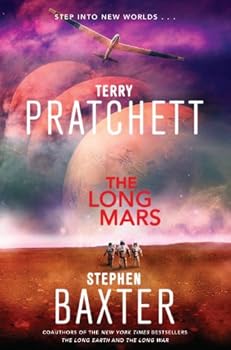![]() The Long Mars by Terry Pratchett & Stephen Baxter
The Long Mars by Terry Pratchett & Stephen Baxter
 The Long Mars by Terry Pratchett and Stephen Baxter still features egregious prose, but it finally begins to tie in some of the unresolved plotlines from earlier books in the LONG EARTH series. We now understand why Roberta (from The Long War) seemed so different; we find out where Willis Linsay, Sally Linsay’s dad and the inventor of the Stepper, has been hiding; and we see more of the Long Earth exploration as the Chinese and the Americans team up to go “where no man has gone before.”
The Long Mars by Terry Pratchett and Stephen Baxter still features egregious prose, but it finally begins to tie in some of the unresolved plotlines from earlier books in the LONG EARTH series. We now understand why Roberta (from The Long War) seemed so different; we find out where Willis Linsay, Sally Linsay’s dad and the inventor of the Stepper, has been hiding; and we see more of the Long Earth exploration as the Chinese and the Americans team up to go “where no man has gone before.”
This book also provides the most stunning portrayals of different Earths so far — chilling and inspiring answers to the “What if?” question that haunts our life-lucky planet. Landscapes full of masses of bacteria, of monument-building crabs, of plant life that approaches sentience, all of it like nothing we have here on Datum Earth.
We also have the beginnings of a real conversation about the Prime Directive as Willis and Sally travel to Mars, discover that there is a Long Mars (hey, that’s the name of this book!), and accidentally-on-purpose give stepping technology to an aggressive species that hadn’t discovered it yet. Willis’s lackadaisical attitude towards his responsibility as the technologically-advanced intruder, really sparks some ethical questions.
The other major plotline revolves around the Next, a generation of children born and raised after Step Day, whose development has been influenced by the other sentient species with whom they have come into contact. I think the idea of the Next is really interesting, but I was annoyed by their portrayal as unempathetic sociopaths. The rhetoric that Pratchett and Baxter give to them as dialogue (especially one of them, Paul) is egregious. Paul describes having sex with a regular human: “Well, can you imagine having sex with a dumb animal, a beast?… Fully human from the forehead down, but from the eyebrows up, the brain of a chimp, more or less.” They sound like mini-Hitlers in their defense of themselves as the next step of humanity, and of the “dim bulb” humans as basically animals. I found the earlier portrayal of Roberta much more ambiguous, nuanced, and potentially likeable.
On the whole, The Long Mars left me feeling less despair about where the series is going, but more anger about the shoddy treatment of such a cool idea.








My pleasure, Robin! And yes, it surely is some kind of an experience, to be sure....
Thanks for the solution to a mystery many decades old. One of my favourite novels, this. Hilariously funny, completely unpredictable,…
Thank you. I’m all caught up. Back to reading Crimson Embers.
Enjoyed your review. I’m reading A War in Crimson Embers and am having the hardest time reminding myself where everybody…
Just saw you like Jack Vance. Me too. Surely he offends you somewhere though?